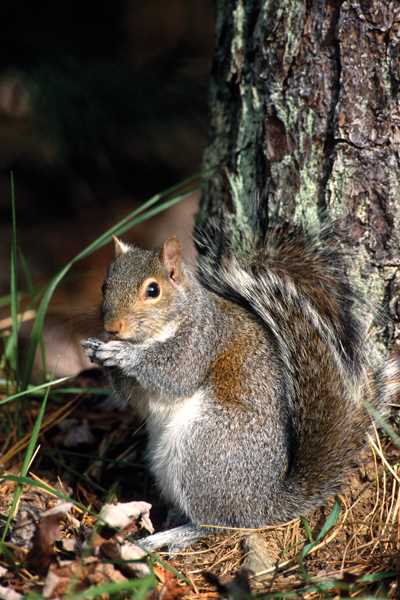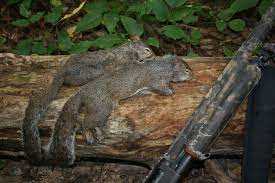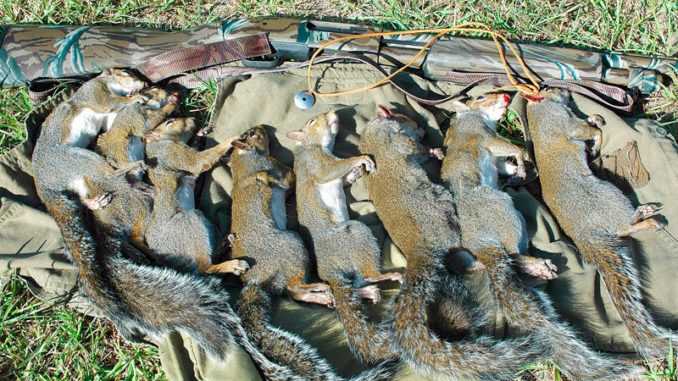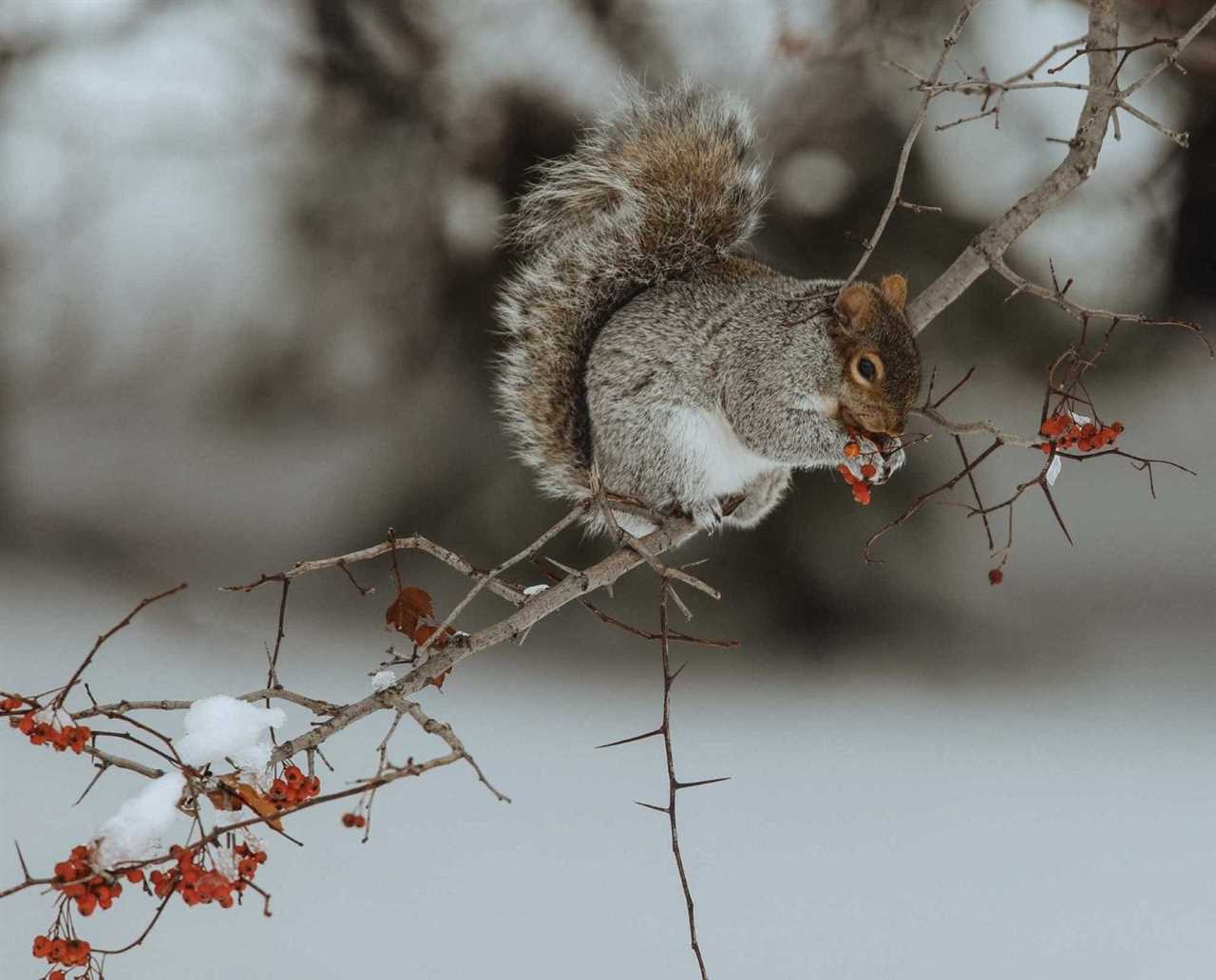Contents
Tips, Guidelines, and Best Practices for a Successful Squirrel Hunting Season

If you’re a hunting enthusiast and looking for an exciting challenge, then targeting squirrels in their hunting season might be the perfect choice for you. Squirrels provide not only a thrilling experience but also a unique opportunity to sharpen your rifle skills and engage in responsible wildlife management.
When it comes to hunting squirrels, it’s important to familiarize yourself with the specific season for these charismatic creatures. Hunting season for squirrels varies depending on your location, so it’s crucial to consult your local wildlife management agency or regulations before heading out in search of this elusive prey. By following the guidelines and restrictions set forth, you can ensure the sustainability of the squirrel population and enjoy a safe and legal hunting experience.
One of the popular methods for squirrel hunting is with a rifle. Choosing the right rifle and ammunition is essential for an effective and humane hunt. Opting for a .22 caliber rifle is a popular choice due to its accuracy and lower recoil. Additionally, using hollow point or soft-tip bullets can help minimize the risk of over-penetration and ensure a clean kill. Remember, ethical hunting practices and responsible firearm handling should always be your top priority.
Furthermore, mastering camouflage techniques can significantly enhance your chances of success when hunting squirrels. These small and agile creatures have keen vision and an uncanny ability to detect movements. Wearing earth-tone clothing, utilizing natural cover, and blending into the environment will give you the advantage of remaining undetected while stalking your prey. Additionally, remaining still and employing patience is key since squirrels tend to be cautious and observant.
Understanding the Hunting Season

The hunting season is a period of time when individuals are legally allowed to hunt and trap certain types of wildlife, such as squirrels. It is important for hunters to understand the specific guidelines and regulations that apply to the hunting season for squirrels in order to ensure both a successful and legal hunting experience.
One key aspect of the hunting season is the use of camouflage. Hunters often utilize camouflage clothing and accessories to blend in with their surroundings and minimize the chances of being detected by squirrels. This allows hunters to get closer to their target without alarming the game.
Another important factor to consider is the specific season for hunting squirrels. Different regions may have different hunting seasons, which may vary based on factors such as population size or conservation efforts. It is crucial for hunters to familiarize themselves with the specific dates and regulations for the hunting season in their area.
In addition to hunting, the trapping of squirrels is also a common practice during the hunting season. Traps are set up in strategic locations to capture squirrels for various purposes, such as population management or wildlife research. Trappers must adhere to specific guidelines and regulations to ensure the ethical and humane treatment of the trapped squirrels.
Understanding the hunting season for squirrels is vital for hunters to engage in responsible and sustainable hunting practices. By following the regulations and guidelines set forth by wildlife management authorities, hunters can enjoy their hunting experience while contributing to the overall conservation and management of game populations.
Legislation and Regulations

Camouflage: When participating in squirrel hunting season, it is important to be aware of the legislation and regulations in your area. Many states require hunters to wear at least 50% orange clothing to ensure visibility and safety.
Squirrels: Before hunting squirrels, it is crucial to familiarize yourself with the specific rules and regulations related to this game. Some states have restrictions on the number of squirrels that can be harvested per day, while others may have specific dates and seasons for hunting.
Trapping: In addition to hunting, some areas allow trapping as a means to capture squirrels. However, it is important to follow all state regulations and obtain the necessary permits if you choose to trap squirrels during the hunting season.
Hunting: When participating in squirrel hunting season, it is important to use proper hunting techniques and follow ethical practices. Always ensure you have the appropriate licenses, permits, and tags before hunting squirrels. It is also important to follow safe firearm handling practices when using a rifle or any other type of weapon.
For: Following legislation and regulations is not only important for the safety and preservation of the game but also for the overall ecosystem. By adhering to the rules, you are helping to maintain a healthy squirrel population and ensuring the sustainability of the game.
Season: The squirrel hunting season is typically limited to a specific time frame. It is important to check the exact dates with your local wildlife agency to ensure you are hunting within the legal season.
Rifle: If you choose to hunt squirrels with a rifle, make sure you are using the appropriate caliber and ammunition for this game. Familiarize yourself with the laws and regulations regarding firearms and always practice safe shooting practices.
Game: Squirrels are considered game in many states, which means they are regulated and can be legally hunted. However, it is important to stay informed about any changes in legislation or regulations that may affect the hunting and harvesting of squirrels.
Tools and Equipment for Squirrel Hunting
When it comes to squirrel hunting, having the right tools and equipment is essential. Here are some must-have items for a successful squirrel hunting season:
- Rifle: A reliable rifle is the main tool for squirrel hunting. Choose a rifle that is accurate, lightweight, and has a small caliber to avoid damaging the game.
- Camouflage: Squirrels have keen eyesight, so wearing appropriate camouflage is crucial for blending in with the surroundings. Opt for camouflage clothing, including a hat, pants, and a jacket, that matches the environment you’ll be hunting in.
- Binoculars: Binoculars are helpful for spotting squirrels at a distance. Invest in a pair of good-quality binoculars with a decent magnification power to help you scan the trees and identify potential targets.
- Game Calls: Using squirrel calls can help attract squirrels by imitating their natural sounds. These calls can be a valuable tool to bring squirrels closer for a better shot.
- Decoys: Squirrel decoys are designed to mimic squirrels and attract them to a specific area. They can be used to divert the attention of squirrels, giving you an opportunity for a better shot.
- Trapping Equipment: Trapping squirrels can be an effective hunting method. Consider using traps, such as box traps or cage traps, along with bait to catch squirrels safely and humanely.
- Ammunition: Make sure to stock up on appropriate ammunition for your rifle. Choose ammunition specifically designed for small game hunting, such as .22 caliber bullets, which are commonly used for squirrel hunting.
- Hunting Bag: A hunting bag is essential for carrying all your gear and supplies. Look for a durable and spacious bag with multiple compartments to keep your equipment organized and easily accessible.
Remember to always check and comply with local wildlife regulations and obtain any necessary hunting licenses before going squirrel hunting. Additionally, practice responsible hunting by following ethical hunting practices and respecting wildlife and their habitats.
Tips for Successful Squirrel Hunting

When preparing for squirrel hunting season, it’s important to have the right equipment and strategies to increase your chances of success. Here are some tips to help you have a productive hunting experience:
| 1. | Choose the right rifle: |
| Using a .22 caliber rifle is recommended for squirrel hunting. It provides enough power to take down squirrels while minimizing damage to the meat. | |
| 2. | Utilize camouflage: |
| Wearing camouflage clothing and using a camouflage blind will help you blend into the surroundings and remain undetected by squirrels. | |
| 3. | Master your shooting skills: |
| Practice shooting at various distances and angles to become proficient. Squirrels are small and agile, so accuracy is key. | |
| 4. | Learn squirrel habits: |
| Knowing where squirrels feed, nest, and travel will help you locate their activity areas. Look for signs such as chewed nuts and droppings. | |
| 5. | Consider trapping: |
| In addition to hunting with a rifle, you can also set up traps to catch squirrels. This can be an effective method, especially if you’re targeting a specific area. | |
| 6. | Play the waiting game: |
| Patience is crucial when squirrel hunting. Find a comfortable spot, remain still, and wait for squirrels to come within range before taking your shot. |
By following these tips and practicing good hunting techniques, you’ll increase your chances of having a successful squirrel hunting season and bringing home some game.
Scouting Techniques
When hunting season for squirrels is in full swing, it’s important to have effective scouting techniques in order to increase your chances of a successful hunt. Here are some tips to help you scout for squirrels:
1. Familiarize yourself with the hunting season for squirrels in your area. Each region may have different regulations and dates, so be sure to check with your local wildlife management agency.
2. Use a rifle or shotgun that is appropriate for squirrel hunting. A .22 caliber rifle is commonly used for its accuracy and effectiveness.
3. Look for signs of squirrel activity, such as chewed nuts, gnawed tree bark, and nests in trees. Squirrels are most active in the early morning and late afternoon, so these are ideal times to scout for them.
4. Practice stealth and camouflage techniques to blend in with your surroundings. Squirrels have keen eyesight and are easily spooked, so it’s important to move quietly and stay hidden.
5. Consider setting up a squirrel trapping system to attract and capture squirrels. This can be an effective way to increase your chances of a successful hunt.
6. Take note of the terrain and vegetation in your scouting area. Squirrels are often found in wooded areas with an abundance of trees and foliage, so focus your efforts in these types of habitats.
By using these scouting techniques, you can better understand squirrel behavior and increase your chances of a successful hunt. Remember to always follow hunting regulations and practice ethical hunting practices.
Choosing the Right Hunting Spot
When it comes to hunting squirrels during the hunting season, choosing the right spot is crucial for a successful hunt. It is important to find an area that is known for its abundant wildlife and has a good population of squirrels.
One strategy for finding a suitable hunting spot is to look for areas with plenty of trees and wooded areas. Squirrels are arboreal creatures and are more likely to be found in areas that provide them with plenty of natural cover and food sources.
Another important consideration when choosing a hunting spot is to be aware of any laws and regulations regarding trapping and hunting game in the area. Make sure to familiarize yourself with the local laws and obtain any necessary permits or licenses before heading out.
Additionally, it’s important to consider the season in which you’ll be hunting squirrels. During the fall and winter months, squirrels tend to be more active as they are gathering food and preparing for the colder months ahead. It may be more productive to choose a hunting spot during these seasons.
Camouflage is another important factor to consider when choosing a hunting spot. Squirrels have excellent eyesight and can easily spot movement or anything out of the ordinary. Make sure to wear appropriate camouflage clothing and use natural cover to blend into your environment.
Lastly, the choice of weapon is crucial for a successful squirrel hunt. A .22 caliber rifle is a popular choice for squirrel hunting due to its accuracy and versatility. Make sure to practice your shooting skills and be proficient with your chosen firearm before heading out to your hunting spot.
By considering these factors, you can increase your chances of a successful squirrel hunting trip. Remember to always prioritize safety and follow ethical hunting practices while enjoying the thrill of the hunt.
Disclaimer: Hunting regulations and seasons may vary by location. Always check your local laws and regulations before hunting.
Effective Hunting Strategies
When it comes to hunting squirrels, there are several effective strategies that can help you increase your chances of success. Whether you prefer using a rifle or enjoy the challenge of trapping, these tips and guidelines will help you maximize your hunting experience.
Hunting with a RifleUsing a rifle is a common method for squirrel hunting. When using this method, it’s important to remember to practice proper wildlife conservation and follow all local hunting regulations. Make sure to spot squirrels in the trees and take aim carefully. |
Hunting with Camouflage
Squirrels have sharp eyesight, so using camouflage can greatly increase your chances of sneaking up on them. Wear clothing that matches the natural colors of the environment and use natural cover to hide your movements. |
Trapping Squirrels
Trapping is another effective method for capturing squirrels. Set up traps near squirrel nests or feeding areas using bait such as nuts or seeds. Make sure to check your traps regularly and release any non-target animals unharmed. |
Hunting for Game
Squirrel hunting can be both challenging and rewarding. It’s important to hunt responsibly and only take what you need. Squirrels provide a valuable source of game meat and by hunting them, you can help control their population and support wildlife conservation efforts. |
Guidelines for Ethical Squirrel Hunting

When participating in squirrel hunting season, it is important to follow ethical guidelines to ensure the safety and well-being of both the wildlife and the hunters. Whether you are hunting with a rifle or using trapping methods, practicing ethical hunting practices is essential.
1. Respect Wildlife: Squirrels are a valuable part of our ecosystem, so it is crucial to have respect for these small creatures. Avoid shooting squirrels unnecessarily and do not take more squirrels than you need for game.
2. Camouflage: Properly camouflage yourself and your equipment to blend in with the natural environment. This will help create a fair and challenging hunting experience while minimizing disturbance to the squirrels and their habitat.
3. Safety First: Always prioritize safety when handling firearms or setting traps. Ensure you are well-trained in firearm safety and follow all local hunting regulations. Be aware of your surroundings and only shoot in a safe direction.
4. Sustainable Hunting: Harvest squirrels in a sustainable manner, keeping in mind the long-term viability of the species. Avoid hunting during breeding seasons when populations are most vulnerable.
5. Leave No Trace: When hunting, be sure to clean up after yourself and leave no trace of your presence. Dispose of any trash or waste properly and avoid damaging the environment.
6. Respect Property Rights: Obtain permission from landowners before hunting on private property and always respect their rules and boundaries. Avoid trespassing on protected areas or sensitive habitats.
7. Continuous Learning: Stay informed about hunting regulations and best practices. Take the time to educate yourself about squirrel behavior, habitat, and population dynamics, and adjust your hunting practices accordingly.
By following these ethical guidelines, hunters can contribute to the conservation of squirrel populations and ensure the sustainability of the game for future generations to enjoy. Happy hunting!
Respecting Wildlife and the Environment
When participating in squirrel hunting season, it’s important to remember the importance of respecting wildlife and the environment. As hunters, we have a responsibility to ensure the long-term sustainability of game populations and the preservation of natural habitats.
Respecting wildlife means adhering to hunting regulations and guidelines. Always obtain the necessary permits and licenses required for hunting squirrels. These regulations are in place to maintain the balance of game populations and prevent overhunting.
Camouflage is commonly used by hunters to blend in with their surroundings and increase their chances of a successful hunt. However, it’s crucial to consider the impact of our hunting practices on the environment. Avoid damaging or disturbing natural habitats while setting up camouflaged positions.
The use of a rifle is a common method for squirrel hunting. It’s essential to always handle firearms safely and responsibly. Familiarize yourself with the proper techniques for shooting and aim for clean and humane kills. This not only respects the wildlife but also contributes to the overall conservation efforts.
Hunting for wildlife should be approached with a mindset of appreciation and conservation. As hunters, we must remember that we are part of a larger ecosystem. Take the time to observe and appreciate the beauty and diversity of wildlife beyond just the prey species. This can enhance the overall hunting experience and foster a deeper connection with the natural world.
Throughout the hunting season, it’s important to leave the environment as you found it. Clean up any trash or litter, and avoid leaving any traces of your presence behind. This ensures that the environment remains pristine for the future enjoyment of both hunters and non-hunters alike.
By following these best practices and guidelines, we can enjoy squirrel hunting season while maintaining the well-being of wildlife and the environment. Let’s promote responsible hunting and conservation efforts for the continued enjoyment of future generations.
Proper Handling and Field Dressing

When participating in wildlife hunting, proper handling and field dressing techniques are essential to ensure the meat is safe for consumption and to preserve its quality. This is especially true when hunting squirrels during the regular season.
Camouflage is key when hunting squirrels, as these small game animals have keen senses and can quickly spot any movement. To increase your chances of a successful hunt, wear appropriate camouflage clothing that matches the surroundings, allowing you to blend in with nature.
Before hunting squirrels, it’s important to know the specific rules and regulations for the season in your area. Some regions may have restrictions on the use of certain trapping methods, rifles, or hunting seasons. Familiarize yourself with these guidelines to ensure that you are hunting within the legal boundaries.
After a successful squirrel hunt, proper field dressing is crucial to prepare the game for consumption. To start, make a small incision at the base of the tail and carefully cut towards the rib cage. Remove the skin by peeling it back towards the head, being cautious not to puncture the organs or contaminate the meat.
Once the skin is removed, it’s important to properly clean the squirrel. Rinse the meat with clean water to remove any dirt or debris. Pay close attention to the cavity where the organs were located to ensure all remnants are removed.
Once the squirrel is cleaned, it’s ready for further preparation such as cooking or freezing. If you plan to cook the meat right away, chilling it in a refrigerator for a few hours will help enhance the flavor and tenderness. Alternatively, if you want to preserve the meat for later use, consider vacuum-sealing or freezing it.
Remember, when handling and field dressing squirrels, it’s crucial to maintain hygiene and cleanliness throughout the process. Wash your hands thoroughly with soap and water after handling the game to prevent any potential health risks.
By following proper handling and field dressing techniques, you can ensure that the squirrels you hunt are transformed into delicious meals without compromising their taste or safety.

A skilled hunter, dedicated conservationist, and advocate for ethical practices. Respected in the hunting community, he balances human activity with environmental preservation.



